
Mission Melody
I’m sitting in the very back row of the van, trying to perfect my hand shadow puppets.
Alyssa, my fellow backseat sufferer, examines my progress and nods. She’s been teaching me
these shadow puppets for the past two hours. Bookless, too weary to talk, and with everyone’s
electronics confiscated by the camp supervisors, there’s little else two awkward teens squished in
a van headed to the middle of nowhere can do.
Alyssa demonstrates the next shadow puppet, hanging her fingers in a limp C shape with
one hand and clasping the other over the back of it and raising her thumb: A wolf, jaw tense,
teeth bared, ears perked and haughty. I attempt a replication and come up with something that
looks—at best—like a horse. I adjust. Now, it’s a crocodile.
I’m vaguely aware of the opening melody of Yellow, by Coldplay, beginning to play for
the fourteenth time. It’s a favorite of our camp supervisor and our van-designated theme song.
In the middle row, the three boys in our group are having a heated debate about the
usefulness of a video game character. One of them changes the subject to lost socks. I write what
they’re saying down in my notebook. It’s interesting, and my English teacher has always told me
to keep a tracker for everything interesting I experience. After a month-long writer’s block, I’m
ready to get some of my creativity back during this school-sponsored trip.
As we drive higher into the mountains, pine trees begin to fill the Colorado grass fields.
Then, patches of snow. In late May. The horizon stretches endlessly. I wonder if we’ll drive off
the edge of the world.
***
It’s sundown when our group arrives at Mission: Wolf. We park next to a conspicuously
unpainted building, and the second van pulls up behind us with the rest of our group. I wonder
what music they played. We line up with our duffels: 14 nerve-frayed, back-sore highschoolers
and three adult supervisors who certainly don’t get paid enough to deal with us.
The snow has formed a thin, cottony layer over the valley. From where we’re parked, I
can see the red roofs of a small settlement halfway up the mountain, obscured by smaller hills. A
wolf howls. A single, piercing note. Several more join the symphony. I shiver.
A Mission: Wolf staffer bundled in a purple coat drives down the hill in a golf cart. When
she reaches the bottom, she exchanges words with our head supervisor. I don’t catch her name.
She glances at the snow, then the sun already disappearing over the distant mountain peaks, and
gestures to the unpainted building. That’s where we’ll be sleeping.
I look at my watch. It’s only eight. In California time, it’s actually seven. Way too early
for bed, no matter how I justify it. It feels even stranger to go to bed without worrying about—or
even knowing—what’s happening tomorrow. No exams. No deadlines. Just me. What am I
without these responsibilities?
I look around to find everyone else in a similar trance, numbly unpacking their duffels.
Already, some are crawling into sleeping bags to hide from the cold, curled in a fetal position.
They’ve got the right idea. I let my duffel slip off my shoulders and take a deep breath.
Somehow, it feels colder without the extra weight.
***
I realize how sore my body is when I finally sit down. At seven in the morning, our group
of students just scaled a muddy hill, probably angled at forty degrees, to reach the main
campground. The log bench is still moist from the dew, and the chill seeps into my bones. We’re
supposed to wait for someone here, but I really don’t care—until I see him.
The first thing I notice about the founder of Mission: Wolf are his leather boots, which
look older than the dirt that clings to their soles. Each step carries a weight to it. His hair is a
blend of silver and brown, bleached by the sun.
In my notebook, I write, “Kent Weber would make a good movie elf.”
This was before he took us to the wolves.
Our group files into the wolf enclosure and sits on a line of log benches. Yes, it had been
a part of the trip description that the school handed out to us at the beginning of the year, but it’s
the kind of activity that doesn’t feel real until it happens.
There are multiple wolf enclosures. And the one we’re in, the “visitor enclosure,” is
home to a one-year-old wolf, Ydun, whom the Mission: Wolf staffers wanted to make their new
mascot.
Forget cats. Ydun is the incarnation of chaos. She barrels in like an ox, somehow running
into a log despite the agility of her species, and immediately jumps on Kent. He calms her down
with a series of head pats and leads her in our direction.
“Don’t pull away when she comes close,” he instructs. “She’ll follow you and knock you
over. Lean forward to meet her and you’ll be fine.”
Ydun pads past us once, twice, circling around the row of benches over and over. She
sniffs at Alyssa, who’s brimming with every possible ounce of anticipation befitting an avid wolf
lover, then turns away. Instead, Ydun veers in my direction. I stiffen as she brushes my knee with
her snout. Then, she pounces on me, rearing up on her hind legs and reaching her front out
towards my shoulders.
“Holy—” I lean back, trying to push her off.
“Don’t do that!” Kent yells in the background. “Push forward! Push forward!”
Push? How? All I can see is Ydun in my face, covering me with her slobber. In my panic,
I lurch forward and headbutt her. Hard. She shrinks back with a whine and runs off to Kent.
He chuckles, “Well that’s better than I expected. You gotta do it like this.” As Ydun
approaches, he crouches, reaches out and brings her face to his. He stretches his lips back and
squares his teeth. The wolf and the man touch teeth.
I blink, midway through clearing my face of wolf slobber.
“It’s how wolves greet each other,” Kent explains.
As if on cue, Ydun scurries up to one of the long-term volunteers, who bends down and
affectionately bumps their teeth against the wolf’s. The process repeats itself with other members
of our school trip. One of the freshmen loses control and falls backwards off the log. Ydun is on
him in a heartbeat, licking all over his face.
“Did he faint?” One of the volunteers runs up. Ydun’s enthusiasm fades to concerned
licks, whines and prods. She probably thought the freshman died. The boy flails his arms and
manages to throw her off.
“I tried to play dead,” he admits. “I thought she would lose interest.”
Kent shakes his head. “That’s the one thing you wouldn’t want to do. You gotta meet
them in the middle. Wild animals will instinctively follow you to the afterlife if they think you
aren’t being responsive.”
***
“Hey.” Alyssa sits down next to me.
“Hey,” I respond. I’d left the enclosure earlier than everyone else. Never being much of a
pet person, Ydun’s hyperactivity wore me out.
Alyssa crosses her legs, swinging them back and forth. “Look what I got.”
There’s a big clump of white wool in her hand. It looks almost suspended in the air, half
an inch above her skin.
“Where’d you get that?”
“Ydun! When I reached out to pet her, this just came off. Kent said it’s shedding season,
so all the soft underfur is loosening.”
I take the wool in my hands, kneading it between my fingers into a ball. It poofs right
back up. Some strands of wolf fur land on my black sweatpants and cling there.
“I see you’ve got a decent chunk,” says Alex, a senior volunteer at Mission: Wolf. He’s
standing behind us in the woodshop, organizing a toolbox. “Has Kent shown you how to make it
into a bracelet yet?”
We look at each other. Alyssa shakes her head. “Sounds cool, can you teach us?”
He gives us a wry grin and walks over. “Of course. I may not be as good as Kent, but I’ve
got quite a bit of practice under my belt. I made all the bracelets on display in the gift shop.”
Alex squats down next to us and takes Alyssa’s fur ball. Splitting it into three equal
sections, he gives one to each of us and uses his own to demonstrate.
“Kent has this one saying that he really likes: Life is…” He pauses, as if waiting for us to
answer. Neither of us have a clue, so he chuckles and continues, “The answer is ‘physics.’ Life is
just physics.”
He stretches and elongates the ball, then begins to twist it, starting from the middle. It
compacts into a string, growing longer and longer. “Everything has an equal and opposite
reaction, similar to wolves. You pull back, they push in; you pull in, they push back,” Alex
explains as he works. When the string is about the length of his forearm, he holds it out to us.
“Now, I’ve got it tight enough. There’s a lot of torsion packed in here. So what I’m going to do
next…” He lets go of one end and the string instantly snaps on itself from the center, twining into
a natural braid.
“See?” Alex grins, looking pretty smug. “Just physics.”
From there, he ties the tips of the braid together to form a bracelet and slips it onto his
wrist.
“Now you guys try.”
***
“Wolves have better communication skills than most humans.” It’s another quote from
Kent.
As I write, a traumatized wolf paces the special enclosure behind me. Obsidian, a black,
shaggy, pure-bred wolf, arrived at Mission: Wolf two weeks before us. Raised as a regular dog
and transferred to the sanctuary by a well-meaning family, he still hasn’t recovered from his
abandonment.
A ray of sunlight passes over me and I look up to see, once more, a sprawling,
snow-covered valley. It’s our lunch break, and I chose this spot on top of the warehouse’s
exterior storage boxes precisely because of the view. After a busy morning, we finally have a
chance to slow down and appreciate the scenery. It feels unreal. Like a painting. Like I’m a
painting, just a cluster of coarse brush strokes that suddenly became aware of their place on the
canvas.
A snarl causes me to freeze. I twist my head around. Obsidian has his snout pressed
against the corner of his enclosure, half a foot away from me. I move closer, hoping to touch
him, and he sprints away. I spend the next half hour watching him run counterclockwise along
the fence. His enclosure is small compared to the others—around the size of a classroom—and
filled with man-made wood obstacles.
He knows exactly when I’m looking at him, even with his back turned, and speeds up his
pacing. Do wolves have some kind of sixth sense?
I lean back, resting my aching lower back against the warehouse wall. The clump of wool
Alyssa gave me earlier sits unused and squashed beneath my water bottle. I had tried making it
into a bracelet earlier, but no matter how I tried to twist the wool, it just wouldn’t tighten. I’d
ended up with a long, fat “string” that flopped uselessly when I let go.
I set my notebook and pencil down and pick the wool up, studying it. It’s surprisingly
compact, like cotton. Each individual strand of fur is part of a greater whole. I try again,
beginning to twist the fur from a fixed centerpoint. My concentration blocks out the ache in my
fingers. All I know is the rhythm of twisting and pulling. I get a hang of the balance—how much
to stretch it, how much to let it shrink.
Obsidian stops pacing. His breathing slows. I don’t need to turn around to know how
close he is. I do, however, see a blur of black fur out of the corner of my eye that tells me he has
laid down beside me.
We breathe in harmony. I keep twisting the wolf fur string. It’s already as long as my
pinkie. Obsidian shifts his head from one paw to another, a strangely human gesture.
I latch onto that thought, but I don’t write it in my notebook. It isn’t a sentiment I’ll forget
easily. But what does this mean? Maybe humans have a sixth sense too.
***
The wolves are hungry. Their howls wake us bright and early at four-thirty in the
morning, gradually harmonizing into a lonesome melody.
I remain curled in my sleeping bag, drifting in the liminality between dream and reality.
When I finally get up a couple hours later, groggy and puffy-eyed, the sun has just come out
from behind the mountain. Traces of the previous night’s snow fall off the tent poles as I make
my way across the construction area to the unfinished building where Javier, our
hiking-specialist supervisor, is making breakfast.
By the time everyone has a full belly, it’s eight in the morning. We shoulder our packs,
ready for another day of manual field labor and wolf caretaking.
A pick-up truck drives past us as we’re walking up the hill. A dense, bloody scent wafts
from the tarp-covered back. At the top, the main camp is a flurry of activity: It’s Feeding Day.
To mimic wolves’ eating habits in the wild, Mission: Wolf feeds their residents twice
every week: Wednesday and Sunday, over ten pounds of meat for each wolf. The newly dead
horses or cows are a donation from local ranchers to the wolf sanctuary, which is ironic because
back in the 1900s, ranchers lobbied to exterminate local wolves.
Far up the mountain, a wolf begins to howl. I wonder if it’s the same one from this
morning. More join in. It’s a false hunt for domesticated wolves, but rewarding all the same.
Kent is standing in the chaos of butchering prep. The staffers have much to do: pull on
those mud boots, make sure you aren’t in clean clothes, get out the butchering mats and
tools—the waste pile will go over there—unload the truck, sort the meat, hurry up and start
butchering ‘cause the wolves are starving.
A portion of our group inches closer to watch the process with dizzy excitement. We’ve
never seen so much red in our lives. A scene that wouldn’t have shocked our ancestors has
become, viewed through modern eyes, a circus.
I stay in the distance, watching the staffers hustle. The sky is a deep, clear blue. A puff of
clouds line the horizon, tipping over the distant mountain peaks. There’s a good breeze today too,
blowing downwind towards the enclosures—probably the reason why the wolves are so
frantic—and over the plains. It feels like God took a piece of heaven and dropped it here, in the
middle of Colorado, for the workers cutting up a dead horse.
A pool of blood begins to form, spilling off the mats and trickling along a deep crevice in
the ground. I had wrongly assumed that the scarred hilltop was eroded by rain. More streams of
blood merge into the main artery until it becomes a languid river, flowing downhill where a
patch of grass lies, tall and vivid, swaying at peace with the wind.
***
The supervisors shout orders at us. It’s natural to leave carrying a bigger mess in your duffel than
when you first arrived. Packing, packing, losing items and finding them again. Finding bug bites
along with them. Finding a fresh, overnight pile of cow dung at the entrance of your tent by
accidentally stepping on it. Finding many things, even the ones never registered as lost. No time
to organize. You can sort through the mess once you’re home.
No breakfast, they say, if we want enough time to see the wolves again. By extension no
dish duty. Is this a win or a loss?
We file into the wolf enclosures one last time for a goodbye visit. The weather is a stark
contrast from the first day we were here, sweltering and dry. Ydun runs up to us with the
morning light bouncing off her fur. I reach out when she passes by and grasp a handful of her
wool to make into bracelets on the long car ride back. At least I won’t have to resort to shadow
puppets anymore.
When Ydun bounds away, her tail wags furiously. What I would give to be able to run
free and mindless. What I would give to be a wolf. I wonder if Ydun knows we’re leaving. I
wonder if any of the other wolves we’ve met do too. Will I ever step foot into this abandoned
corner of heaven again?
Mission: Wolf feels like the kind of place that will disappear when you leave it. There’s
only one chance. Kind of like Calypso’s island. There’s an unassuming majesty to this place,
these hills and forests. The harmony achieved between nature and civilization, man and beast,
the tamed and the untamed, is a kind of peace like no other.
At the camp’s central lodge, our group takes turns using the restroom. Those who are
finished gather in the distant hillside parking lot, helping our supervisors strap luggage on top of
the vans, but I linger by the central lodge, waiting for Alyssa to finish up.
Below me, on the lodge patio, some of the seasonal volunteers are playing a song. Alex is
on the guitar. Another shaggy-bearded volunteer whom I don’t know the name of is drumming.
A girl not much older than me is humming.
I let the music carry me, weightless, into some higher dimension. It’s a familiar yet
elusive melody, as if I’ve heard it over and over in my past lives, and it had left footprints in my
mind.


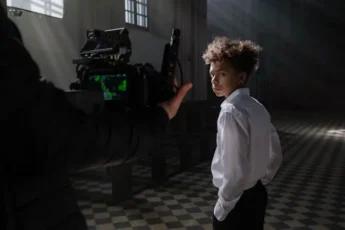
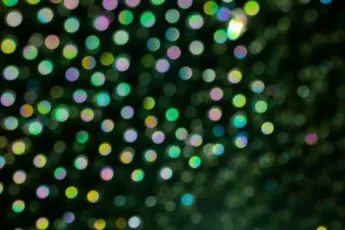
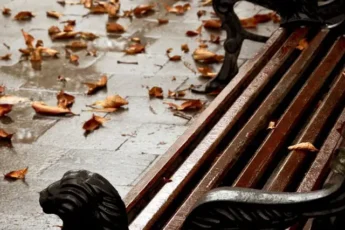
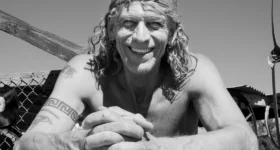
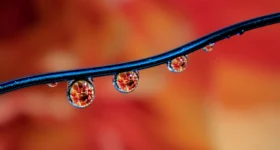

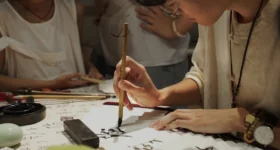
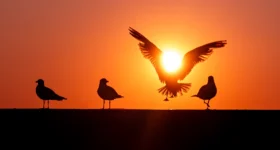

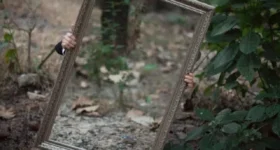
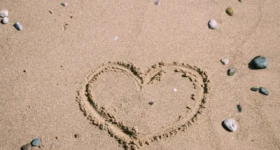
Leave a Comment